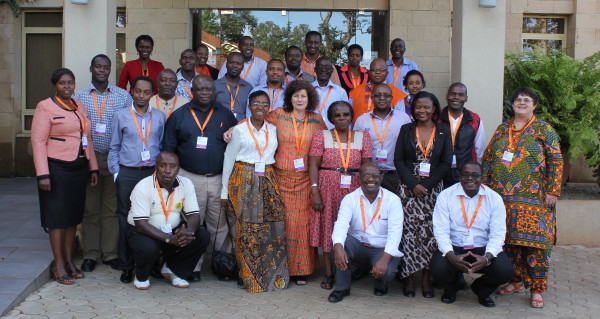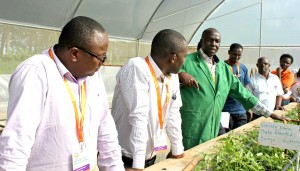
The fourth consultation of the Sweetpotato Seed System Community of Practice (CoP) was held in Nairobi from 8-10 December 2015. The meeting was attended primarily by partners from national sweetpotato programmes who are developing and implementing models for sustainable production of pre-basic seed.
The technical objectives of the meeting were to review estimates of seed requirements and draft business plans; and develop tips for good practice in pre-basic seed production. Speaking at the opening of the meeting, Margaret McEwan, SASHA seed systems component leader, outlined the progress made in building sustainable pre-basic seed models.
She explained that so far, regional and in-country training and capacity strengthening to improve procedures in tissue culture labs and screen houses are helping to ensure a consistent supply of pathogen tested pre-basic cuttings. In addition, progress has been made in improving technologies that will increase multiplication rates and reduce the costs of seed production; and in promoting demand to increase the willingness to pay for quality seed. Furthermore, partner institutions are working to estimate seed demand from the root producer through to the basic multiplier; and to develop a business case for sustainable pre-basic seed production for the public and private sectors.
One of the main features that promotes interaction among the CoP members is the Google D-List. According to McEwan’s report, this online CoP discussion group now has over 100 members.
The Fourth Consultation was attended by Esther Gitau, the CEO of the African Seed Trade Association (AFSTA). In her keynote address, Gitau outlined the role of AFSTA in the African seed industry, and highlighted prevailing seed trade challenges at country level such as weak regulatory frameworks, lack of appropriate seed information, long variety release system, poor variety maintenance programs and counterfeit seed.

Participants also had an opportunity to visit the Kenya Plant Health Inspectorate Services (KEPHIS) – Plant Quarantine and Biosecurity Station (PQBS) on the afternoon of 9 December 2015. The Officer-in-Charge, George Momanyi welcomed the participants and provided a brief history and background of the PQBS. While there, they visited the virology lab, which is currently the only ISO/IEC 17025:2005 accredited laboratory in SSA testing viruses in sweetpotato. They also went to the tissue culture lab and observed the procedure used for virus cleaning using thermotherapy, and meristem culture; and conservation of plantlets. In the screen house, participants observed and received explanations of pre-basic seed operations by KEPHIS.
The next meeting of the Seed Systems Community of Practice will take place in Arusha, Tanzania, from 11-12 May 2016.